|
|
|
Sort Order |
|
|
|
Items / Page
|
|
|
|
|
|
|
| Srl | Item |
| 1 |
ID:
149189
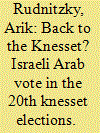

|
|
|
|
|
| Summary/Abstract |
Arab politics in Israel recorded several notable achievements in the March 2015 Knesset elections. Sixteen Arab and Druze candidates were elected to serve in the Israeli parliament, the largest number ever elected. In addition, Arab voter turnout increased significantly compared to previous election campaigns and reached 63.5%, its highest level since the early 2000s, thus reversing a period of political apathy caused by the events of October 2000. These results may indicate a turning point in the political behaviour of the Arab public, and that the Knesset has once again become a relevant arena of political influence for the majority of the Arab public. An analysis of voting patterns in the recent elections in the Arab sector suggests that these changes were spurred by the participation of the Joint List. In many Arab localities, support for the Joint List, which ran as a grouping of the major political parties that have represented the Arab public in recent years, was positively associated with a rising turnout compared to previous elections.
|
|
|
|
|
|
|
|
|
|
|
|
|
|
|
|
| 2 |
ID:
149199
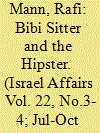

|
|
|
|
|
| Summary/Abstract |
The article focuses on the emergence of a new comical political discourse in the 2015 Knesset elections, in which humour was adopted as a major campaign strategy and senior Israeli politicians took upon themselves the role of comedians in ad clips. The development of such discourse is presented as the culmination of an ongoing process of transformation of the political discourse in Israel since 1977. The process was inspired by the American political and media scenes, as well as by changes in Israel’s media map. Social media played a central role in the new comical discourse, as it was heavily used both for the viral dissemination of the clips and for creating engagement. But even as the affectivity of the videos was apparent in terms of the creation on ‘media buzz’, exposure and web engagement, there is still no proof to its influence on the elections outcome. Furthermore, it raises questions about the ability of the Israeli citizenry to rationally discus crucial issues and to form opinion on them.
|
|
|
|
|
|
|
|
|
|
|
|
|
|
|
|
| 3 |
ID:
149188
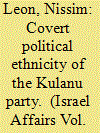

|
|
|
|
|
| Summary/Abstract |
The Israeli general elections of March 2015 saw the advent of a new middle-class party. Kulanu, headed by Moshe Kahlon, achieved 10 seats for its representatives in the Knesset (Israeli parliament). This article proposes that Kulanu be viewed not only as a middle-class party, but also as a new addition to the list of Mizrahi ethnic parties. Kulanu’s appearance on the political centre-stage in Israel rested, at least among the Jewish population, upon its ability to offer a political wavelength and series of political symbols of upwardly mobile ethnicity in Israel – first and foremost among them the elusive ethnicity of the Mizrahi middle class. Kulanu’s political ethnicity assured widespread legitimacy for its agenda as well as empathy on the part of the source of its power – the Mizrahi middle class.
|
|
|
|
|
|
|
|
|
|
|
|
|
|
|
|
| 4 |
ID:
149187
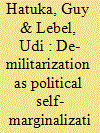

|
|
|
|
|
| Summary/Abstract |
In the elections for the 19th and 20th Knesset, the Labor Party fared badly. The party list for these two election campaigns was almost completely devoid of ‘bithonistim’ – members of the Israeli security elite (MISEs). The article examines the placement of MISEs on the Labor Party list from 1977 up until the 2015 elections. It shows how, from the establishment of the state, the Labor Party was the natural home of MISEs, thereby becoming the dominant party with regard to the Israeli agenda, in which military and security issues occupy a central place. The decrease in the number of MISEs on the Labor list, and their replacement with Member of parliament who are associated more closely with civil issues, have marginalized the Labor Party in relation to the public agenda. The article shows how in Israel, a society organized around cultural militarism, the party’s demilitarization has led to political marginalization.
|
|
|
|
|
|
|
|
|
|
|
|
|
|
|
|
| 5 |
ID:
149196
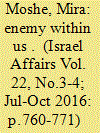

|
|
|
|
|
| Summary/Abstract |
Voting behaviour is often constructed by candidates’ ability to manipulate and set in motion voters’ social ‘nervous system’ by means of juxtaposing two social groups – ‘ours’ and ‘theirs’ – against one another. In the Israeli political arena, this means a sociopolitical ‘zero sum’ game between the right wing and the left wing. The present article seeks to decode the characteristics of right-wing vs. left-wing cognitive metaphors activated in the 2015 Israeli elections. Findings indicate that both sides sought to activate cultural schemes based on a sense of local belonging and social identity, with the emotional discourse focused on identifying and excluding internal enemies (i.e. those who are not ‘us’ or belong to ‘our group’).
|
|
|
|
|
|
|
|
|
|
|
|
|
|
|
|
| 6 |
ID:
149195
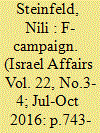

|
|
|
|
|
| Summary/Abstract |
In the 2015 Israeli national elections, social media and especially Facebook were used as primary campaign platforms, where politicians of all parties and orientations expressed their agendas, made policy statements and communicated with potential voters. The present article employs a new methodology, discourse network analysis, to explore the relationships between party leaders and discourse themes, based on leaders’ pre-election statements on Facebook. The findings highlight prominent themes and the relationships formed between leaders and themes, and between leaders and each other. The network formed by party leaders’ shared agendas and themes resembles the parties’ positioning in the parliament after the election, strengthening the assumption that Facebook has been used strategically as a campaign tool by the leaders of parties running for parliament.
|
|
|
|
|
|
|
|
|
|
|
|
|
|
|
|
| 7 |
ID:
149181


|
|
|
|
|
| Summary/Abstract |
When Benjamin Netanyahu announced the intention to dissolve his government, paving the way for general elections less than two years after winning the 2013 elections, many critics and commentators expressed indifference, if not fatigue. The general impression, in the days following the legislators’ decision to dissolve the 19th Knesset, was that the upcoming election was ‘pointless’.
|
|
|
|
|
|
|
|
|
|
|
|
|
|
|
|
| 8 |
ID:
149190
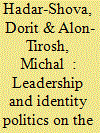

|
|
|
|
|
| Summary/Abstract |
This article addresses identity politics in Israeli society on the eve of the 2015 elections as recounted in interviews with Israeli children. Children belonging to four groups of Israeli society (secular Jews, religious Jews, Ethiopian Jews and Arabs) were asked about the suitability of male and female candidates running for the position of Israeli prime minister. The findings can be viewed through two types of power relations: gender power relations and power relations between groups of different collective identities. Gender power relations reflect gender inequality. One example of this inequality is that female candidates are perceived as transparent in regard to their suitability for the post of prime minister. Power relations between different groups reflect the hierarchy of collective identities; secular Jews hold a hegemonic status, while other groups weaken each other in order to strengthen their own relative status within the hierarchy. This study shows that power relations between the four groups in Israeli society are present and internalized as early as elementary school a finding that holds important implications as Israel works toward its ultimate goal of democracy.
|
|
|
|
|
|
|
|
|
|
|
|
|
|
|
|
| 9 |
ID:
149186
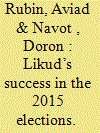

|
|
|
|
|
| Summary/Abstract |
The current article develops an explanation for Likud’s success, which goes beyond the existing structural and circumstantial accounts. It argues that Likud’s success should be sought for in the utilization of Hobbesian logic by its leader, Benjamin Netanyahu. By revealing the commonalities between Hobbes’s political thinking and Rhetoric, and Netanyahu’s political conduct, this paper sheds new light on Netanyahu’s leadership and sources of legitimation and authority in Israel, which are understudied. We demonstrate that Netanyahu’s Hobbesian dimension is best reflected in his understanding of the nature of civil and political rights in the context of an ongoing struggle for survival and self-determination.
|
|
|
|
|
|
|
|
|
|
|
|
|
|
|
|
| 10 |
ID:
149185
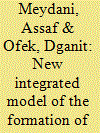

|
|
|
|
|
| Summary/Abstract |
This article integrates various aspects of the office-seeking approach, the policy-seeking approach and the institutional rule approach to theories about establishing coalitions to create a new model that takes into account the mutual influence between the formation and stability of the coalition, party policies and the difference between the status of the party that formed the coalition and that of its coalition partners. It also introduces a new index based on mechanical physics to measure the degree of fragmentation in the coalition. Using data from the 20 terms of the Israeli Knesset, particularly the Twentieth Knesset, as our case study, the article demonstrates that large ideological distances between the political parties can be an advantage for the coalition’s formateur. The results confirm the validity of the proposed model, which awaits further validation in other parliaments worldwide.
|
|
|
|
|
|
|
|
|
|
|
|
|
|
|
|
| 11 |
ID:
149191
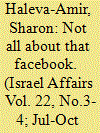

|
|
|
|
|
| Summary/Abstract |
Only 26 months separate the elections for the 19th Knesset (January 2013) from those for the 20th (March 2015), yet the digital campaigns employed in the latter demonstrate interesting shifts. Using empirical data collected from social network sites and from journalistic campaign coverage, this article analyses the use of the online sphere by parties, candidates and audiences, identifying evolving shifts in digital campaigning. The findings point out the reoccurrence of some trends, whether intensified or otherwise, as well as the emergence of new trends that illustrate the evolution of Israeli online campaigning. The prominent recurring trends are (1) personal politics; (2) professionalized campaigns; (3) alternative funding models; (4) social activism; and (5) constant violation of election law provisions. The new trends include: (1) Facebook’s alternatives; and (2) assimilation of web culture into the campaigns. Analysing the findings suggests that current campaigns focus on entertainment rather than on real discourse and stress the obsolescence of the current legal regime
|
|
|
|
|
|
|
|
|
|
|
|
|
|
|
|
| 12 |
ID:
149197
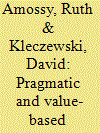

|
|
|
|
|
| Summary/Abstract |
A discursive and argumentative analysis of the Israeli 2015 elections reveals how electoral strategies displayed unexpected similarities between rival parties such as the Likud and the Zionist Union, on the one hand, and the Jewish Home and Meretz, on the other hand, in their respective approaches to foreign policy and to the Israeli–Palestinian conflict. While the mainstream Right and Left mainly emphasized security motives, used consequence-based arguments, and appealed to fear, the practical reasoning of the two smaller parties (Jewish Home and Meretz) competing with the Likud and the Zionist Union applied a value-based rather than a merely instrumental argumentation. This reconfiguration of the political map enlightens the peculiar dynamics of the 2015 elections.
|
|
|
|
|
|
|
|
|
|
|
|
|
|
|
|
| 13 |
ID:
149183
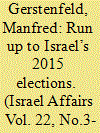

|
|
|
|
|
| Summary/Abstract |
The 19th Knesset dissolved itself on 8 December 2014. New elections were set for 17 March 2015. Polls taken immediately after the dissolution of the Knesset showed major public disaffection with Netanyahu. Yet in polls on hypothetical run-offs against other party leaders, Netanyahu was seen to win in all cases. Labour and Hatnuah ran together. So did four Arab parties. A new party, Kulanu, led by Moshe Kahlon, joined the contenders. Several parties held primaries. In the campaign, online videos played an increasingly important role. Polls during the final days and exit polls turned out to be unreliable. The Likud became the largest party in the 20th Knesset with 30 seats.
|
|
|
|
|
|
|
|
|
|
|
|
|
|
|
|
| 14 |
ID:
149193
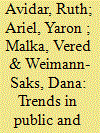

|
|
|
|
|
| Summary/Abstract |
The emergence of new media, primarily social networks, raises questions about the interactions at play between ‘new’ and ‘old’ media in terms of the media and the public agendas. This topic is particularly relevant during elections. By analysing news from three Israeli television channels and using an online monitoring system to analyse user discourse over six weeks preceding Election Day, this article seeks to trace the shaping processes of the media agenda and public agenda along the axes of ‘new media/old media’ and ‘free user discourse/professional media discourse’.
|
|
|
|
|
|
|
|
|
|
|
|
|
|
|
|
| 15 |
ID:
149184
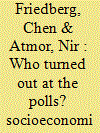

|
|
|
|
|
| Summary/Abstract |
2015 was an important year in the history of Israeli general elections: voter turnout rose by 4.5% compared to the 2013 elections, exceeding the 70% threshold after 16 years of low rates. Interesting as this may be, a more interesting question is: who were the voters turning out at the polls in the 2015 elections (and where)? When looking at the election results from the municipal perspective, we can see a variance between localities: turnouts were high in some places while in others they were low. In order to explain the differences in voting patterns among localities we conducted an ecological analysis of the aggregated data regarding participation rates in 196 municipalities in Israel, as well as their social and economic characteristics. The most salient finding is that political participation in peripheral and low socioeconomic localities was lower than in the country’s geographical and generally more economically robust centre.
|
|
|
|
|
|
|
|
|
|
|
|
|
|
|
|
|
|
|
|
|